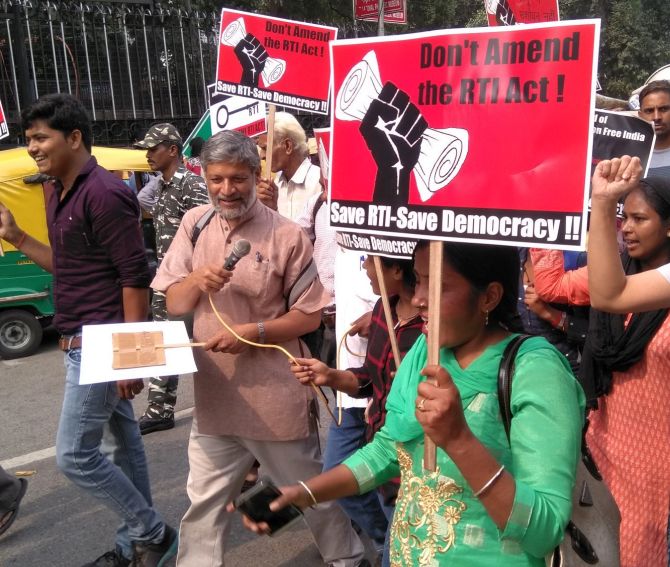'This amendment, if passed, will bring the Information Commission firmly under the authority of the government.'

Amid protests by Opposition parties, the Narendra Damodardas Modi government on Friday, July 19, introduced the Right to Information (Amendment) Bill 2019 in the Lok Sabha.
The amendment, apart from changing the term of office, salaries, allowances and conditions of service of information commissioners at the central and state level, also seeks to take away the status of information commissioners from being equivalent of election commissioners, and thus will weaken the independence and autonomy of the Information Commission, suspect RTI activists who question the intention of the government.
One such opponent of the amendment to the RTI Act, 2005, is India's longest serving (he was the CIC from October 26, 2005 till September 19, 2010) and first chief information commissioner, Wajahat Habibullah.
"This government needs to be persuaded that transparency and accountability is a very important chapter of the Information Commission, in terms of its independence, and the same will be at stake if this amendment is passed,"" Habibullah, below, tells Rediff.com's Prasanna D Zore.
How do you view the government's move to introduce an amendment to the RTI Act 2005?
Pay and allowance is not as important a point as the status of the Information Commission itself.
When this amendment was proposed last year, it was opposed by the activists and former information commissioners and so it was pushed.
Even the information commissioner of the time had advised against it saying it would erode the autonomy of the authority, which is important for the fair and impartial functioning of the Information Commission.
The commission cannot be under the authority of any government.
This (amendment, if passed) will bring the Information Commission firmly under the authority of the government.
Changing the status would certainly compromise the autonomy of the commission and thereby compromise the (functioning) of the government.
In my view, this would go against the honourable prime minister's own views about the RTI.
He has expressed very eloquently that any compromise on the autonomy of the Information Commission would affect the effectiveness of his own government.
This is an institution that can give the government the feedback on its own functioning.
That is the primary duty of the Information Commission and that would certainly be compromised if it were brought under the (control of the) government.
Why then is the Modi government pushing this amendment?
I think this (amendment) is ill-informed.
It is not about status of the information commissioner being equal to a Constitutional authority.
It is the question of the authority and autonomy of the commission.
The effectiveness of the commission will be compromised and diluted if this amendment is passed.
This will bring the information commissioner within the purview of the government's authority.

Given the majority the Bharatiya Janata Party enjoys in the Lok Sabha, isn't it a certainty that the amendment will be passed?
It is the question of reasoning with the government and convincing them that this (amendment) is against the interest of the government itself.
A long-standing argument that goes is if the autonomy of the Information Commission weakens or strengthens governance and governments.
A strong Information Commission can only strengthen a government.
A strong Information Commission ensures the functioning of the government in a manner that doesn't compromise on corruption, or buckle under political pressure, which is how any government should function.
This government has repeatedly emphasised the importance of transparency and accountability which, in fact, is a part of the BJP's manifesto.
Now, this government needs to be persuaded that transparency and accountability is a very important chapter of the Information Commission, in terms of its independence, and the same will be at stake if this amendment were passed.
How will the roles, powers and responsibilities of the Information Commission be diluted if this amendment is legislated?
In essence, this (passage of amendment) will make the Information Commission subject to government pressure.
It will not be able to function independently of political authority.
Do you think the National Democratic Alliance government is anti-RTI?
I wouldn't go so far because transparency and accountability, which are the fundamentals of the RTI, are part of this government’s manifesto.
I think it is just a matter of not being suitably or properly informed (about the impact of this amendment on the independence of the Information Commission).
The honourable prime minister fully understands that (importance of transparency and accountability in governance).
There is a growing concern among RTI activists about the government's secrecy with respect to the RTI Act. Do these fears have any basis?
That has always been there, whether it is this government or the previous government.
Any government in position of authority generally may or may not like its functioning to be totally exposed.
You may want the defects in your own government to be exposed and that has been the exact intent of our current prime minister.











 © 2025
© 2025